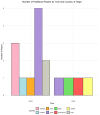Applications of large language models in psychiatry: a systematic review
- PMID: 38979501
- PMCID: PMC11228775
- DOI: 10.3389/fpsyt.2024.1422807
Applications of large language models in psychiatry: a systematic review
Abstract
Background: With their unmatched ability to interpret and engage with human language and context, large language models (LLMs) hint at the potential to bridge AI and human cognitive processes. This review explores the current application of LLMs, such as ChatGPT, in the field of psychiatry.
Methods: We followed PRISMA guidelines and searched through PubMed, Embase, Web of Science, and Scopus, up until March 2024.
Results: From 771 retrieved articles, we included 16 that directly examine LLMs' use in psychiatry. LLMs, particularly ChatGPT and GPT-4, showed diverse applications in clinical reasoning, social media, and education within psychiatry. They can assist in diagnosing mental health issues, managing depression, evaluating suicide risk, and supporting education in the field. However, our review also points out their limitations, such as difficulties with complex cases and potential underestimation of suicide risks.
Conclusion: Early research in psychiatry reveals LLMs' versatile applications, from diagnostic support to educational roles. Given the rapid pace of advancement, future investigations are poised to explore the extent to which these models might redefine traditional roles in mental health care.
Keywords: LLMS; artificial intelligence; generative pre-trained transformer (GPT); large language model; psychiatry.
Copyright © 2024 Omar, Soffer, Charney, Landi, Nadkarni and Klang.
Conflict of interest statement
The authors declare that the research was conducted in the absence of any commercial or financial relationships that could be construed as a potential conflict of interest.
Figures






Similar articles
-
The Role of Large Language Models in Transforming Emergency Medicine: Scoping Review.JMIR Med Inform. 2024 May 10;12:e53787. doi: 10.2196/53787. JMIR Med Inform. 2024. PMID: 38728687 Free PMC article.
-
Assessing the Alignment of Large Language Models With Human Values for Mental Health Integration: Cross-Sectional Study Using Schwartz's Theory of Basic Values.JMIR Ment Health. 2024 Apr 9;11:e55988. doi: 10.2196/55988. JMIR Ment Health. 2024. PMID: 38593424 Free PMC article.
-
Large language models for conducting systematic reviews: on the rise, but not yet ready for use-a scoping review.J Clin Epidemiol. 2025 May;181:111746. doi: 10.1016/j.jclinepi.2025.111746. Epub 2025 Feb 26. J Clin Epidemiol. 2025. PMID: 40021099
-
Large language models and psychiatry.Int J Law Psychiatry. 2025 Jul-Aug;101:102086. doi: 10.1016/j.ijlp.2025.102086. Epub 2025 Feb 27. Int J Law Psychiatry. 2025. PMID: 40020592
-
Large Language Models for Mental Health Applications: Systematic Review.JMIR Ment Health. 2024 Oct 18;11:e57400. doi: 10.2196/57400. JMIR Ment Health. 2024. PMID: 39423368 Free PMC article.
Cited by
-
From statistics to deep learning: Using large language models in psychiatric research.Int J Methods Psychiatr Res. 2025 Mar;34(1):e70007. doi: 10.1002/mpr.70007. Int J Methods Psychiatr Res. 2025. PMID: 39777756 Free PMC article. Review.
-
Evaluating Diagnostic Accuracy and Treatment Efficacy in Mental Health: A Comparative Analysis of Large Language Model Tools and Mental Health Professionals.Eur J Investig Health Psychol Educ. 2025 Jan 18;15(1):9. doi: 10.3390/ejihpe15010009. Eur J Investig Health Psychol Educ. 2025. PMID: 39852192 Free PMC article.
-
Artificial intelligence and robotic surgery in clinical medicine: progress, challenges, and future directions.Future Sci OA. 2025 Dec;11(1):2540742. doi: 10.1080/20565623.2025.2540742. Epub 2025 Aug 2. Future Sci OA. 2025. PMID: 40753448 Free PMC article. Review.
-
Role of large language models in mental health research: an international survey of researchers' practices and perspectives.BMJ Ment Health. 2025 Jun 12;28(1):e301787. doi: 10.1136/bmjment-2025-301787. BMJ Ment Health. 2025. PMID: 40514050 Free PMC article.
-
The applications of ChatGPT and other large language models in anesthesiology and critical care: a systematic review.Can J Anaesth. 2025 Jun;72(6):904-922. doi: 10.1007/s12630-025-02973-9. Epub 2025 Jun 16. Can J Anaesth. 2025. PMID: 40524117 English.
References
-
- Terra M, Baklola M, Ali S, El-Bastawisy K. Opportunities, applications, challenges and ethical implications of artificial intelligence in psychiatry: a narrative review. Egypt J Neurol Psychiatr Neurosurg. (2023) 59:80. doi: 10.1186/s41983-023-00681-z - DOI
Publication types
LinkOut - more resources
Full Text Sources

